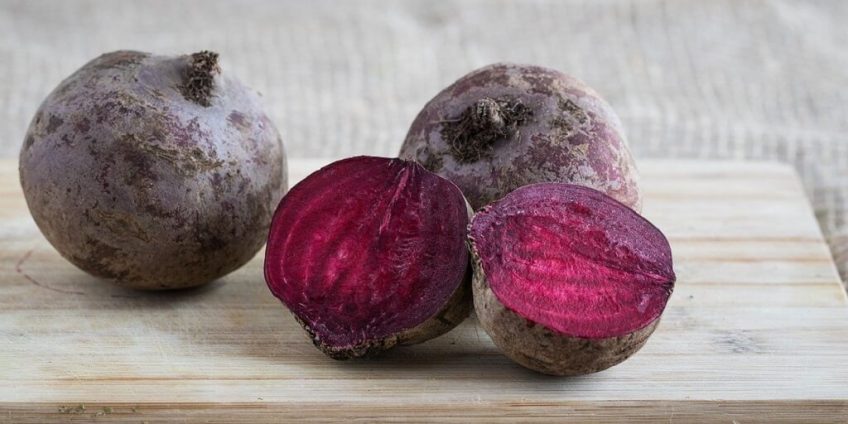Scroll to Recipes with Beetroot / चुकंदर as ingredient
Beetroot is one of the several cultivated varieties of Beta vulgaris grown for their edible taproots and leaves (called beet greens). It is also known by the names table beet, garden beet, red beet, dinner beet, or golden beet.
Apart from the culinary purpose, it is also has used for food coloring and medicinal uses. The chemical adipic acid- rarely occurs in nature but happens to occur naturally in beetroot.
Beetroot is a very healthy vegetable, and its history dates back to ancient times. The first traces of beetroot cultivation was found in the Mediterranean region. It helps treat anemia, indigestion, constipation, piles, kidney disorders, dandruff, gall bladder disorders, cancer, and heart disease.
Commonly Known as
| Language | Name | Written as |
|---|---|---|
| Arabic | albinger | البنجر |
| Bengali | bitrut | বিটরুট |
| Gujarati | beet no kund | બીટનો કંદ |
| Hindi | chukandar | चुकंदर |
| Kannada |
Bīṭrūṭ |
ಬೀಟ್ರೂಟ್ |
| Malayalam | bitte root | ബീറ്റ് റൂട്ട് |
| Marathi | bitarut | बीटरूट |
| Punjabi | chukander | ਚੁਕੰਦਰ |
| Tamil | akkarakilangu vagai | அக்காரக்கிழங்கு வகை |
| Telugu | beat route | బీట్ రూట్ |
| Urdu | chukandar | چکندر |
Nutritional Profile of Beetroot
Nutritional profile per 100 gms
- Calories: 43
- Protein: 1.6g
- Carbohydrate: 10g
- Fiber: 2.8g
- Fat: 200mg
- Sodium: 78mg
- Potassium: 325mg
Source: USDA & Google
Benefits
Helps Keep Blood Pressure regular
Nitrates help lower blood pressure. Beetroot is a vegetable that has high
The proportion of nitrate. Hence, it helps in lowering blood pressure.
Source: ncbi.nlm.nih.gov
Helps With Inflammation
Chronic inflammation is responsible for several diseases, such as obesity, heart disease, liver disease, and cancer. Beetroot has a pigment called betalains that has potent anti-inflammatory properties. Thus it helps fight inflammation.
Source: ncbi.nlm.nih.gov
Supports brain health
A reduction in blood flow and oxygen supply to the brain may contribute to mental and cognitive health decline with increasing age. Nitrates in beetroot may improve mental and cognitive function by increasing blood flow to the brain.
Source: ncbi.nlm.nih.gov
Anti-Cancer Properties
Cancer is a fatal disease caused by the uncontrolled growth of the cells in the body. The antioxidant content and anti-inflammatory nature of beets may have the ability to prevent cancer.
Source: ncbi.nlm.nih.gov
May Help in Weight Loss
Beetroot has more water content and low calories. Beetroots contain moderate amounts of protein and fiber. All these factors are beneficial for helping in weight loss.
Source: ncbi.nlm.nih.gov
Side Effects
Because beetroot is rich in oxalates, it may cause kidney stone problems. Even if rare, beetroot may have some allergies. They may include rashes, hives, itchiness, and even chills and fever. It may aggravate gastrointestinal problems if you are suffering from them. It may also be harmful to pregnant women.
Frequently Asked Questions
Why is the beetroot considered good?
Beetroot builds up stamina, increases blood flow, is antioxidant, helps in weight loss. Moreover, Beets are rich in natural chemicals called nitrates that help with lowering blood pressure.
How much beetroot juice should one drink daily?
Drinking 2 cups of beetroot juice in a day is beneficial. It may help with building stamina. However, one should also consult a nutritionist to give you the exact amount of juice intake and the right time for its intake based on your body requirements.
How to prepare beetroot juice?
Wash the beets thoroughly. Peel the skin and chop it in cubes. Chur it in the juicer. You can add a spoon of sugar if you don’t like its taste. However, one should be cautious about intake on the sugar in a day.

